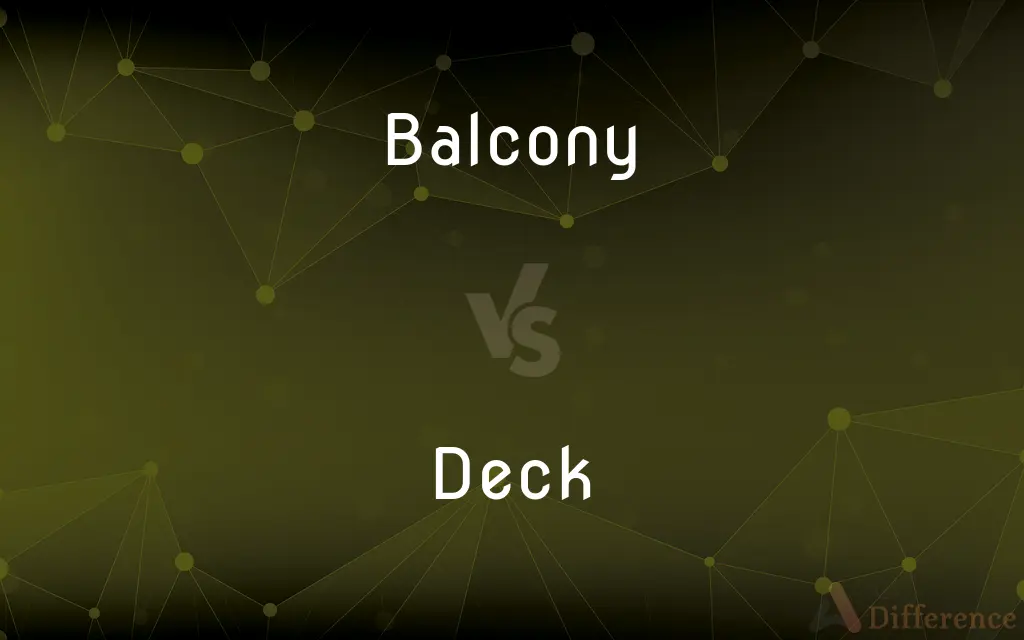Balcony vs. Deck — What's the Difference?
By Fiza Rafique & Maham Liaqat — Updated on March 7, 2024
Balconies are elevated platforms attached to buildings, while decks are outdoor, ground-level or elevated platforms not requiring building attachment.

Difference Between Balcony and Deck
Table of Contents
ADVERTISEMENT
Key Differences
A balcony is an elevated platform projecting from the wall of a building, typically surrounded by a railing or balustrade, and is accessible from an upper-floor door or window. Decks, on the other hand, are outdoor platforms that extend the living space of a home, whether they are constructed at ground level or elevated.
Balconies are architectural features of buildings and are often used as small outdoor spaces for leisure, such as enjoying the view, gardening, or dining. Unlike balconies, decks can be detached from a building or attached to it at any level, not just above the ground floor.
While balconies serve as an extension of the interior living space to the outside, typically on upper floors, decks enhance outdoor living areas and can be designed at various elevations. Balconies are more associated with urban living due to their common presence in apartment buildings, providing a private outdoor space in densely populated areas. Decks, however, are more prevalent in suburban or rural settings where there is more land available for horizontal expansion.
The structural differences between balconies and decks also reflect their distinct purposes and locations. Balconies, being part of the building's structure, require careful integration into the architectural design, ensuring safety and stability from an elevated position. Decks, while also needing to be structurally sound, offer more flexibility in design and location, accommodating various styles and sizes to suit the homeowner's needs and the available outdoor space.
Both balconies and decks add value to a property by increasing the usable outdoor area, but they cater to different lifestyles and preferences. Balconies offer a quick escape to the outdoors without leaving the comfort of one's home on higher floors, while decks provide a more spacious area for social activities and enjoying nature on ground level or higher.
ADVERTISEMENT
Comparison Chart
Location
Attached to a building at an elevated level
Can be ground-level or elevated, attached or detached from a building
Purpose
Extension of indoor living space outdoors on higher floors
Enhances outdoor living space for various activities
Common Use
Urban apartments and hotels for private outdoor space
Suburban homes for socializing, dining, and relaxation
Material
Concrete, steel, wood (depending on the building)
Primarily wood or composite materials
Safety
Surrounded by railings or balustrades for safety
Often surrounded by railings, especially if elevated
Compare with Definitions
Balcony
Elevated platform on a building's exterior.
She enjoyed her morning coffee on the balcony.
Deck
Outdoor platform extending living space.
They hosted barbecues on their spacious deck.
Balcony
Accessible from an upper-floor window or door.
The master bedroom opens onto a private balcony.
Deck
Space for entertaining and relaxation.
Their deck was their favorite spot for summer evenings.
Balcony
Enclosed with railings for safety.
The glass railings of the balcony provided both safety and style.
Deck
Surrounded by railings if above ground.
The deck's railing was decorated with outdoor lights.
Balcony
Small outdoor space for apartments.
Their apartment's balcony offers a stunning city view.
Deck
Ground-level or elevated wooden area.
The elevated deck provided a perfect view of the sunset.
Balcony
Architectural feature for outdoor leisure.
The balcony added charm and utility to their living space.
Deck
Can be attached or detached from a house.
They built a freestanding deck in their backyard.
Balcony
A balcony (from Italian: balcone, "scaffold") is a platform projecting from the wall of a building, supported by columns or console brackets, and enclosed with a balustrade, usually above the ground floor.
Deck
A platform extending horizontally from one side of a ship to the other.
Balcony
A platform that projects from the wall of a building and is surrounded by a railing, balustrade, or parapet.
Deck
A platform or surface likened to a ship's deck.
Balcony
A gallery that projects over the main floor in a theater or auditorium.
Deck
An unroofed platform, typically with a railing, that adjoins a building or is built on a rooftop.
Balcony
(architectural element) An accessible structure extending from a building, especially outside a window.
Deck
The roadway of a bridge or an elevated freeway.
Balcony
An accessible structure overlooking a stage or the like.
Deck
The piece of hard material, usually wood or composite, to which the frames housing the wheels are attached on a skateboard or landboard.
Balcony
A platform projecting from the wall of a building, usually resting on brackets or consoles, and inclosed by a parapet; as, a balcony in front of a window. Also, a projecting gallery in places of amusement; as, the balcony in a theater.
Deck
A pack of playing cards.
Balcony
A projecting gallery once common at the stern of large ships.
Deck
A group of data processing cards.
Balcony
An upper floor projecting from the rear over the main floor in an auditorium
Deck
A digital file containing slides for a presentation.
Balcony
A platform projecting from the wall of a building and surrounded by a balustrade or railing or parapet
Deck
A tape deck.
Deck
To furnish with or as if with a deck.
Deck
(Slang) To knock down
He decked his sparring partner.
Deck
To clothe with finery; adorn. Often used with out
We were all decked out for the party.
Deck
To decorate
Decked the halls for the holidays.
Deck
Any raised flat surface that can be walked on: a balcony; a porch; a raised patio; a flat rooftop.
Deck
(nautical) The floorlike covering of the horizontal sections, or compartments, of a ship. Small vessels have only one deck; larger ships have two or three decks.
To swab the deck
Deck
(aviation) A main aeroplane surface, especially of a biplane or multiplane.
Deck
(cards) A pack or set of playing cards.
Deck
A set of cards owned by each individual player and from which they draw when playing.
Deck
(journalism) A headline consisting of one or more actual lines of text.
Deck
A set of slides for a presentation.
Deck
(obsolete) A heap or store.
Deck
(slang) A folded paper used for distributing illicit drugs.
Deck
(colloquial) The floor.
We hit the deck as bullets began to fly.
Deck
(theatre) The stage.
Deck
(uncommon) To furnish with a deck, as a vessel.
Deck
(informal) To knock someone to the floor, especially with a single punch.
Wow, did you see her deck that guy who pinched her?
Deck
(card games) To cause a player to run out of cards to draw, usually making them lose the game.
Deck
To dress (someone) up, to clothe with more than ordinary elegance.
Deck
To decorate (something).
Deck
(transitive) To cover; to overspread.
Deck
To cover; to overspread.
To deck with clouds the uncolored sky.
Deck
To dress, as the person; to clothe; especially, to clothe with more than ordinary elegance; to array; to adorn; to embellish.
Deck thyself now with majesty and excellency.
And deck my body in gay ornaments.
The dew with spangles decked the ground.
Deck
To furnish with a deck, as a vessel.
Deck
To knock down (a person) with a forceful blow; as, He decked his opponent with a single punch.
Deck
The floorlike covering of the horizontal sections, or compartments, of a ship. Small vessels have only one deck; larger ships have two or three decks.
Deck
The upper part or top of a mansard roof or curb roof when made nearly flat.
Deck
The roof of a passenger car.
Deck
A pack or set of playing cards.
The king was slyly fingered from the deck.
Deck
A heap or store.
Who . . . hath such trinketsReady in the deck.
Deck
A main aëroplane surface, esp. of a biplane or multiplane.
Deck
The portion of a bridge which serves as the roadway.
Deck
A flat platform adjacent to a house, usually without a roof; - it is typically used for relaxing out of doors, outdoor cooking, or entertaining guests.
Deck
Any of various floor-like platforms built into a vessel
Deck
Street name for a packet of illegal drugs
Deck
A pack of 52 playing cards
Deck
A porch that resembles the deck on a ship
Deck
Be beautiful to look at;
Flowers adorned the tables everywhere
Deck
Decorate;
Deck the halls with holly
Deck
Knock down with force;
He decked his opponent
Common Curiosities
Are balconies only found in apartment buildings?
While common in apartments, balconies can also be found in hotels, offices, and some multi-story single-family homes.
Can balconies be used for gardening?
Yes, balconies often serve as small garden spaces for apartment dwellers, using containers and vertical gardening techniques.
Can a deck be attached to any level of a house?
Yes, decks can be attached at ground level or to any floor, providing a transition between indoor and outdoor spaces.
Is it possible to add a balcony to an existing building?
Adding a balcony to an existing building is possible but requires structural assessment and adherence to building codes and regulations.
What materials are used to build decks?
Decks are primarily built with wood or composite materials designed to withstand outdoor conditions.
Can decks be customized?
Yes, decks offer flexibility in design, size, and materials, allowing for customization to match the homeowner's needs and preferences.
Are balconies considered private outdoor spaces?
Yes, balconies are typically private, offering secluded outdoor space to the apartment or building occupants.
What is a Juliet balcony?
A Juliet balcony is a very shallow balcony with a railing attached to the outside of a window or French door on an upper floor, offering the appearance of a balcony without the extended space.
What is the main difference between a balcony and a deck?
The main difference is that balconies are elevated platforms attached to buildings, accessible from upper floors, while decks can be ground-level or elevated, attached or detached from buildings.
Do all decks need railings?
Railings are required for safety on elevated decks but may not be necessary for ground-level decks, depending on local building codes.
How does weather affect the maintenance of decks and balconies?
Weather can affect the durability of the materials used in decks and balconies, requiring regular maintenance to address wear from rain, sun, and temperature changes.
Can balconies have roofing or coverings?
Some balconies may have coverings or roofing to provide shade and protection from the elements, though this varies by design and preference.
What safety features are important for decks and balconies?
Important safety features include sturdy railings and balustrades, secure attachments to the main structure, and materials that can withstand the intended load and environmental conditions.
How do balconies and decks add value to a property?
They increase the usable outdoor space, enhancing the property's aesthetic appeal and functionality, thereby potentially increasing its market value.
Do you need a permit to build a deck or balcony?
Generally, building a deck or adding a balcony requires a permit and adherence to local building codes to ensure safety and compliance.
Share Your Discovery

Previous Comparison
Retirement vs. Superannuation
Next Comparison
Curmudgeonly vs. CantankerousAuthor Spotlight
Written by
Fiza RafiqueFiza Rafique is a skilled content writer at AskDifference.com, where she meticulously refines and enhances written pieces. Drawing from her vast editorial expertise, Fiza ensures clarity, accuracy, and precision in every article. Passionate about language, she continually seeks to elevate the quality of content for readers worldwide.
Co-written by
Maham Liaqat















































